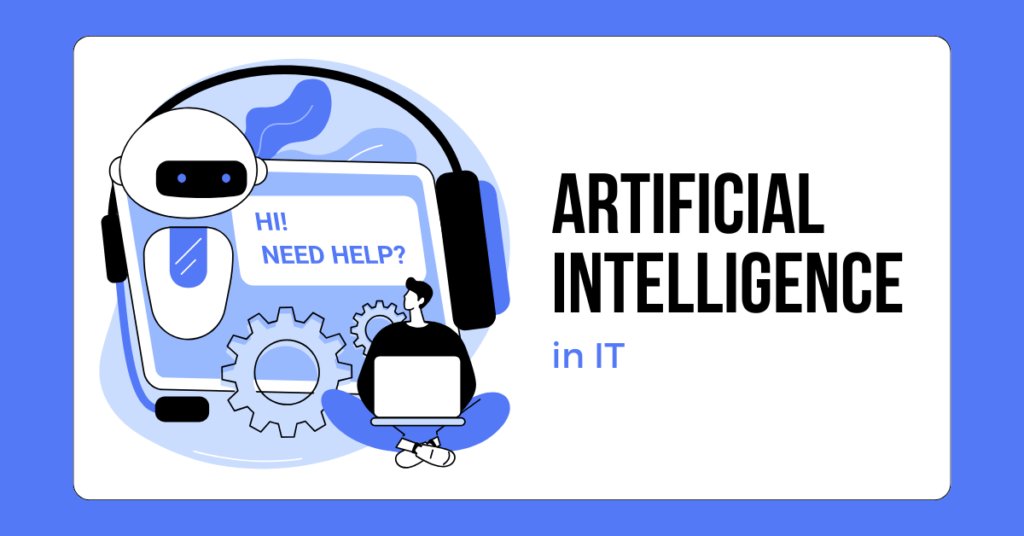I. Introduction
In the ever-evolving world of technology, one force is rapidly reshaping the landscape of Information Technology (IT): Artificial Intelligence (AI). Once a concept confined to science fiction, AI has become an integral part of modern IT operations, driving innovation and efficiency like never before. From automating routine tasks to enhancing cybersecurity and optimizing software development, AI is the future fuel powering the IT revolution.
This blog post will explore the multifaceted role of AI in IT, examining its impact across various domains, including IT operations, cybersecurity, software development, and IT service management. We’ll delve into real-world examples, emerging trends, and the potential challenges and ethical considerations surrounding AI’s integration into the IT ecosystem.
II. AI’s Impact on IT Operations
In the fast-paced world of IT operations, AI is rapidly becoming an indispensable tool for streamlining processes, reducing downtime, and enhancing overall efficiency. One of the most significant applications of AI in this realm is predictive maintenance and issue resolution. By leveraging machine learning algorithms and analyzing vast amounts of data, AI systems can identify potential hardware or software failures before they occur, enabling proactive maintenance and minimizing costly disruptions.

Moreover, AI is revolutionizing the automation of routine IT tasks, such as patching, backups, and system monitoring. Intelligent automation not only reduces the workload on IT professionals but also mitigates the risk of human error, ensuring consistent and reliable operations. AI-powered monitoring and anomaly detection systems can continuously analyze system logs, network traffic, and other data sources, identifying potential threats or performance issues in real-time.
Leading IT companies have already embraced AI in their operations, reaping significant benefits. For instance, Google uses AI to optimize its data center operations, improving energy efficiency and reducing cooling costs. Microsoft’s Azure platform employs AI for intelligent workload scheduling and resource allocation, enhancing performance and cost-effectiveness.
III. AI-Driven Cybersecurity
In the realm of cybersecurity, AI is rapidly becoming an essential ally in the ongoing battle against ever-evolving cyber threats. One of the primary applications of AI in this domain is threat detection and response. By analyzing vast amounts of data from various sources, such as network traffic, user behavior, and system logs, AI algorithms can identify potential security breaches or malicious activities with unprecedented accuracy and speed.
Moreover, AI-powered behavioral analytics and user/entity behavior analytics (UEBA) solutions can establish baselines for normal user and system behavior, enabling the detection of anomalies that may indicate a potential security breach. These solutions can also automate various security tasks, such as vulnerability management, patch deployment, and incident response, significantly reducing the workload on cybersecurity professionals.
However, it’s important to acknowledge the limitations and challenges associated with AI in cybersecurity. While AI can significantly enhance threat detection and response, it is not a silver bullet. Adversaries are constantly evolving their tactics, and AI models must be regularly updated and fine-tuned to stay ahead of new threats. Additionally, there are concerns around the potential for AI systems to be compromised or manipulated by sophisticated attackers, underscoring the need for robust security measures and human oversight.
IV. AI and Software Development
The software development lifecycle is another area where AI is making a significant impact. AI-assisted coding and code generation tools are revolutionizing the way developers write and maintain software. These tools can analyze existing codebases, identify patterns and best practices, and generate new code snippets or even entire modules, saving developers time and effort while promoting code consistency and quality.
Intelligent code reviews and testing are another application of AI in software development. By leveraging machine learning algorithms, AI-powered tools can analyze code for potential bugs, security vulnerabilities, and performance issues, providing valuable insights and recommendations to developers. These tools can also automate various testing processes, such as unit testing and regression testing, improving code quality and reducing the risk of introducing defects.
Furthermore, AI is being leveraged to optimize software architecture and performance. By analyzing application behavior, usage patterns, and resource utilization, AI systems can recommend architectural changes or configuration adjustments to improve scalability, reliability, and overall performance.
Leading technology companies are already leveraging AI in their software development processes. For example, Microsoft’s IntelliCode tool uses AI to provide intelligent code completion and code style suggestions, while Google’s TensorFlow Extended (TFX) platform employs AI for end-to-end machine learning model development and deployment.
V. AI’s Role in IT Service Management
IT service management (ITSM) is another domain where AI is making a significant impact. One of the most visible applications of AI in this area is the use of virtual agents and chatbots for IT support. These intelligent assistants can handle routine inquiries, provide self-service solutions, and escalate more complex issues to human support agents, improving response times and customer satisfaction.

AI is also being used for intelligent ticket routing and prioritization. By analyzing the context and content of support tickets, AI algorithms can automatically assign them to the appropriate support team or technician, based on factors such as expertise, workload, and priority. This streamlines the ticket management process, ensuring that issues are addressed promptly and by the most qualified personnel.
Predictive analytics powered by AI is another valuable tool in IT service management. By analyzing historical data and patterns, AI systems can forecast future demand, identify potential capacity constraints, and recommend proactive measures to ensure optimal service delivery. This enables IT organizations to better plan and allocate resources, reducing the risk of service disruptions and improving overall efficiency.
Moreover, AI-driven knowledge bases and self-service portals are becoming increasingly popular in IT service management. These intelligent systems can provide personalized recommendations and solutions to users based on their queries, significantly reducing the burden on support staff and empowering users to resolve issues independently.
VI. Emerging AI Trends in IT
As AI continues to evolve and mature, new trends and applications are emerging in the IT domain. One such trend is AIOps (Artificial Intelligence for IT Operations), which combines AI, machine learning, and big data analytics to automate and optimize various IT operations processes. AIOps solutions can proactively identify and resolve issues, optimize resource allocation, and provide actionable insights for better decision-making.
Intelligent process automation (IPA) is another emerging trend that combines AI with robotic process automation (RPA) to automate complex business processes. By leveraging AI capabilities such as natural language processing, computer vision, and machine learning, IPA can handle more sophisticated and dynamic tasks, further enhancing efficiency and productivity.
AI is also playing an increasingly important role in business intelligence and analytics. By analyzing vast amounts of structured and unstructured data, AI algorithms can uncover valuable insights, identify patterns and trends, and provide data-driven recommendations to support better decision-making across various IT domains.
However, as AI continues to permeate the IT landscape, ethical considerations and challenges must be addressed. Issues such as algorithmic bias, data privacy, and the impact of AI on the workforce are crucial concerns that must be carefully navigated. IT professionals and organizations must prioritize responsible and ethical AI adoption, ensuring that these powerful technologies are used in a transparent, fair, and accountable manner.
VII. Conclusion
The role of AI in Information Technology is undeniably transformative. From optimizing IT operations and enhancing cybersecurity to streamlining software development and improving IT service management, AI is revolutionizing the way IT organizations operate and deliver value to their stakeholders.
As we look to the future, the integration of AI into IT will only deepen, with new and innovative applications emerging at an unprecedented pace. However, this journey is not without its challenges. IT professionals and organizations must embrace a mindset of continuous learning and adaptation, staying abreast of the latest AI developments and best practices.
Ethical considerations, such as algorithmic bias, data privacy, and the impact on the workforce, must be carefully addressed to ensure the responsible and transparent adoption of AI technologies. By striking the right balance between innovation and ethical responsibility, the IT industry can harness the full potential of AI and drive transformative change.
The future of IT is inextricably linked to the evolution of AI. It is a future filled with boundless opportunities for those willing to embrace this powerful technology and shape it to serve the greater good. IT professionals who can effectively navigate the AI-driven landscape will be at the forefront of this revolution, driving innovation, efficiency, and long-lasting impact.
Related Content
- How artificial intelligence is transforming the world
- The present and future of AI
- Importance of AI In Information Technology
